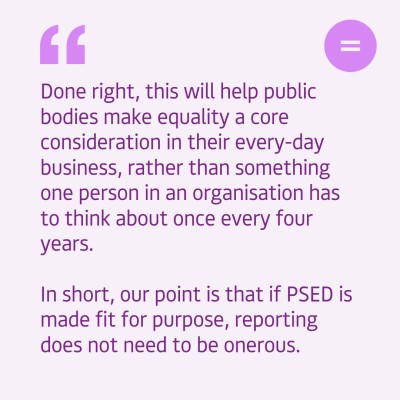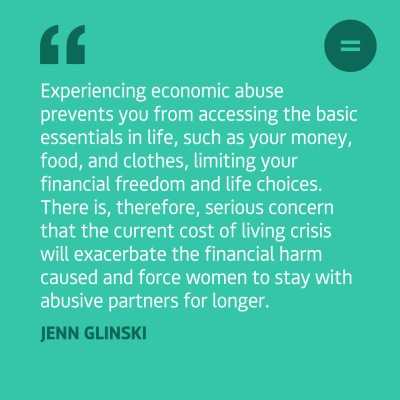Engender blog
All of Engender’s latest news. Reports, reviews, books, articles, and information from across Scotland’s women’s sector.
We would love to hear from other feminists around Scotland. Check out our guidelines for more information on how you can blog for us.
Cost of Living Crisis: Gaps in support for women on low incomes in Scotland

As part of our blog series on the cost of living crisis, Laura Robertson from The Poverty Alliance talks about their recent report with the Scottish Women's Budget Group on the detrimental impacts on the lives of women living on low-incomes in Scotland caused by the crisis.
“I spoke to my friend who told me she has been starving and only eats at night. I have started doing that though it didn’t go well with me the first day, but I will get used to it.” (Idia, aged 35-44, lone mother and asylum seeker)
The cost of living crisis is having devastating impacts on people living on low incomes in Scotland. Research with 38 women affected by the cost of living crisis in Scotland published in November by the Poverty Alliance and the Scottish Women’s Budget Group reveals the devastating impacts on women living in a range of circumstances across Scotland. Our research found that women are facing deepening levels of poverty and hardship as they struggle to afford essentials. This blog examines gaps in support for women living on low incomes, reflecting on both the Autumn Statement and the Scottish Budget.
A new look for the Public Sector Equality Duty?

The public sector equality duty (PSED) is the key lever for gender mainstreaming in policymaking in Scotland. As mainstreaming fans will know, Engender and other equality stakeholders have been advocating for a review of the Scottish Specific Duties (SSDs) of the PSED, which is now happening.
At present the SSDs are not fit for purpose in embedding equality at the heart of public sector work, supporting public bodies in fulfilling their obligations, and ultimately better enabling equality and fulfilment of rights for women and others oppressed groups. So while we were really pleased when the review was announced, we were disappointed that the current proposals are far from ambitious enough. We’ve been working this year to push the Scottish Government to go much further with the review, so the Public Sector Equality Duty can actually fulfil its potential as something which pushes, and supports, public bodies to actually achieve better outcomes for women and people with protected characteristics.
GUEST BLOG: Giving birth during the pandemic

We've been working with the ALLIANCE and The Health and Social Care Academy to gather information about experiences of pregnancy and maternity services during Covid-19 from women across Scotland. Alongside our work, we're sharing a series of guest blogs reflecting on those experiences. Here, Barbara Flynn shares her experience of giving birth in the summer of 2020.
In March 2020, when lockdown was imposed, I was six months pregnant with my second child. Overnight, my thoughts went from, ‘I think I’ll book a pregnancy massage’ to, ‘will our lives ever return to normal?!’. I also went from eagerly anticipating my midwife appointments to agonising about having to go into hospital to give birth – the last place, it seemed, that anyone wanted to be now! As our street is near one of the main thoroughfares to the Queen Elizabeth University Hospital, ambulances speeding past became a familiar background noise, each one a grim reminder of my own impending trip to hospital.
GUEST BLOG: Economic Abuse and the cost of living crisis

As part of our guest blog series on the cost of living crisis, researcher Jenn Glinski explores how the current rise in costs is impacting victim-survivors of economic abuse.
Content warning: This blog discusses different forms of domestic abuse and their impact.
The current cost of living crisis and the difficult decision to ‘heat or eat’ is one that victim-survivors of economic abuse are all too familiar with. However, unlike the government-imposed crisis that the rest of the country has been subjected to, the daily cost of living crisis victim-survivors experience is deliberately forced upon them by their abusive (ex)partners. Experiencing economic abuse prevents you from accessing the basic essentials in life, such as your money, food, and clothes, limiting your financial freedom and life choices. There is, therefore, serious concern that the current cost of living crisis will exacerbate the financial harm caused and force women to stay with abusive partners for longer.
Delivering Equally Safe: Challenging and eradicating violence against women
-400.png)
To mark the annual 16 Days of Activism campaign, our Policy Officer for Engender's Delivering Equally Safe project, Hannah Brisbane, shares some background on our briefing for MSPs on the importance of primary prevention in challenging and eradicating men's violence against women.
We are currently in the middle of the 16 Days of Activism against Gender-Based Violence. This annual campaign runs from the International Day for the Elimination of Violence against Women on the 25th of November until the 10th of December, which is Human Rights Day.
Downloads
 Engender Briefing: Pension Credit Entitlement Changes
From 15 May 2019, new changes will be introduced which will require couples where one partner has reached state pension age and one has not (‘mixed age couples’) to claim universal credit (UC) instead of Pension Credit.
Engender Briefing: Pension Credit Entitlement Changes
From 15 May 2019, new changes will be introduced which will require couples where one partner has reached state pension age and one has not (‘mixed age couples’) to claim universal credit (UC) instead of Pension Credit.
 Engender Parliamentary Briefing: Condemnation of Misogyny, Racism, Harassment and Sexism
Engender welcomes this Scottish Parliament Debate on Condemnation of Misogyny, Racism, Harassment and Sexism and the opportunity to raise awareness of the ways in which women in Scotland’s inequality contributes to gender-based violence.
Engender Parliamentary Briefing: Condemnation of Misogyny, Racism, Harassment and Sexism
Engender welcomes this Scottish Parliament Debate on Condemnation of Misogyny, Racism, Harassment and Sexism and the opportunity to raise awareness of the ways in which women in Scotland’s inequality contributes to gender-based violence.
 Gender Matters in Social Security: Individual Payments of Universal Credit
A paper calling on the Scottish Government to automatically split payments of Universal Credit between couples, once this power is devolved to the Scottish Parliament.
Gender Matters in Social Security: Individual Payments of Universal Credit
A paper calling on the Scottish Government to automatically split payments of Universal Credit between couples, once this power is devolved to the Scottish Parliament.
 Gender Matters Manifesto: Twenty for 2016
This manifesto sets out measures that, with political will, can be taken over the next parliamentary term in pursuit of these goals.
Gender Matters Manifesto: Twenty for 2016
This manifesto sets out measures that, with political will, can be taken over the next parliamentary term in pursuit of these goals.
 Scottish NGO Briefing for UN Special Rapporteur on Violence Against Women
Joint briefing paper for the UN Rapporteur on Violence Against Women.
Scottish NGO Briefing for UN Special Rapporteur on Violence Against Women
Joint briefing paper for the UN Rapporteur on Violence Against Women.

Newsletter
Sign up to receive our newsletter here:
Sign up to our mailing list
Receive key feminist updates direct to your inbox: